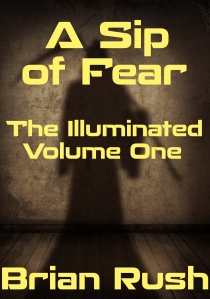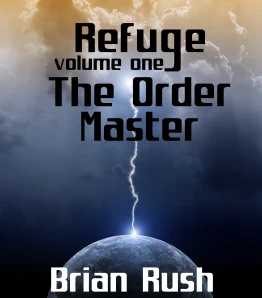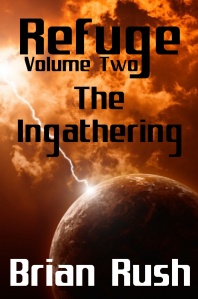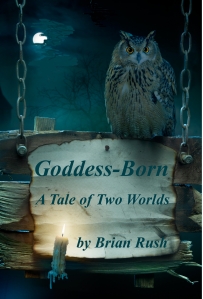 Here’s the third chapter of my new novel, A Sip of Fear, volume one of The Illuminated. A slight hitch happened on the way to publication, so the book will be available tomorrow rather than today. I’ll post links to the book at Amazon, Kobo, and Smashwords in a new post then, and add it to the sideboard. I’m going through the Smashwords distribution system for other outlets (Barnes & Noble, Apple, etc.) so it should be available there within a week or so.
Here’s the third chapter of my new novel, A Sip of Fear, volume one of The Illuminated. A slight hitch happened on the way to publication, so the book will be available tomorrow rather than today. I’ll post links to the book at Amazon, Kobo, and Smashwords in a new post then, and add it to the sideboard. I’m going through the Smashwords distribution system for other outlets (Barnes & Noble, Apple, etc.) so it should be available there within a week or so.
Meanwhile, hope you enjoy this third installment.
I encountered Ela-Tu for the first time when I was fifteen.
Magic fired up in my brain a few years before that, surrounding me like music that never stopped playing. Feelings coming my way from other people, auras and borderline realities seen from the corner of my eye, strands of fate plucked like chords or whispering secrets in my ear.
A lot of people have a little sensitivity to the Power. It’s much more common than most people realize. The sense you get when you’re being watched. The knowledge of who’s calling on the phone before you answer it. The fear that grabs the heart when a loved one is in danger, felt before the word comes. The desperate prayer in troubled times that gives birth to a miracle of shifted odds. Many people know such things. Magic in small amounts is nothing out of the ordinary.
I have more than a little of it. That’s rarer. Those with the ability to become virtuosos of the Art gulp down occult lore like drunkards. We can’t help it, even though the payoff is scant. Most of what’s written on the subject is complete crap made up by sensation-mongers and scam artists. A small subset covers better ground, but amounts to poor, if honest, understanding of one of the biggest puzzles life has to offer. Only a few rare tracts offer real, sound knowledge, because only a few of us have ever discovered that knowledge.
Among the cream of the magical world, the Illuminated are in a class by ourselves.
As far as I know, anyway. Maybe there are others out there that would make us look like amateurs, keeping themselves hidden from us because they can. I can’t speak about hypotheticals like that.
What I do know is that Illuminated always come from the ranks of those who have a special gift of magic and have studied the art, and nearly all Illuminated have at one time or another dabbled in the summoning of spirits. Now, spirits are of several kinds. Most spirits spring from the mind of the magic user in a form of controlled imagination that endows the creature with a measure of the summoner’s free will. That sort of spirit is useful for enhancing spells or managing them in an intelligent way while the mind of the magician is engaged elsewhere. But is the spirit real or imaginary? In the shifting world of the mental moonscapes, pregnant with sorcery, where meaning takes the place of mass and association replaces distance, everything is both and the question can’t be asked or answered.
But some spirits are different. Some touch on older and stronger magic, dangerous and seductive. Among those are the ones we call the Luminous. The Luminous defy all of the arts of ceremonial magic. You can’t command a Luminous by invoking names of God, sigils, or words of power. You can’t negotiate a pact with one of them; the terms of bonding are fixed, take it or leave it. The Luminous may come to your call, or you may call it without realizing what you’re doing, or it may summon you — or it may ignore you altogether and leave your efforts empty of result. But however it happens, meeting a Luminous changes your perspective on yourself, your life, and the cosmos, and after the bonding you are never the same.
For me, it happened when I played with spirit summoning, a teenager who knew almost nothing, certainly not what I was doing, and sent a call out to a spirit who could help me be a healer. No name. No idea what I would call. I just wanted to heal the sick and hurt. It seemed right.
For six weeks when I was fifteen, every night I drew a magic circle in the air with a consecrated wand and focused my will and desire. Every night I sent the call. Every night I went to sleep wondering why I bothered, why I persisted when nothing ever followed.
Until it did. Until she came.
When Ela-Tu answered my call, resistance was impossible. I fell in love. Since then, I have had more lovers than I can count — a side effect of bonding to a spirit of Life — but no matter who shares my bed, I have always been hers. I will be hers until I die.
ξ
Being Illuminated comes at a price and carries an obligation. I thought about that as I walked along Golden Gardens Drive in the misty rain the next day. Sometimes the obligation isn’t a problem. I didn’t mind looking for signs of illness in the trees and wildlife and healing it, or doing the same for people. But Erica walked beside me as a reminder of other obligations that weren’t so simple.
The Ice Woman wore a hooded jacket. Her glossy brown hair framed her face in tight curls under the hood and collected drops of rainwater to sparkle in the cool air. I turned to her and tried to smile. Then I noticed that some of those water drops had frozen, beading her hair like woven-in gems. My breath smoked. Hers didn’t. Not a good sign. She was angry.
She was always angry with me. By her lights, I deserved it. Most people would agree with her. The problem is, I didn’t have much choice in the matter. And it’s not as if she didn’t know that going into our relationship. She picked up on the thought without my having to say anything.
“I know,” she said. She looked at me. I felt the temperature drop. “I knew what you were. I asked you if you could be faithful to me.”
“And I told you probably not,” I said.
“Yes. I should have listened. I couldn’t. I —” She stopped and frowned. “You meant a lot more to me than you should have.”
I stopped to inspect the wide blackened hole in an oak tree, burned some years past by lightning. The tree had sprouted around the dead area and now it looked like a dark door into mystery. I smiled. The tree didn’t need my attention. I turned back to my ex-girlfriend, who did.
“You meant a lot to me, too, Erica. Really, you did. And you still do. I didn’t cheat on you because I didn’t care. I did it because —”
“I know, Gordon. You did it because Ela-Tu wanted you to. She never wants you to say no to anyone. She probably won’t be happy until you have a couple of dozen offspring.”
“She hasn’t pressured me about that, actually. Kind of surprising.” I touched her arm, and despite everything, felt a surge of desire. Ela-Tu still wasn’t talking to me, but her influence remained strong, and my powers hadn’t weakened. I stopped myself from pulling Erica into an embrace. She wouldn’t have appreciated it, and it would only have hurt her more. “I’m sorry, Erica.”
“I know that, too. But it doesn’t really help.” She sighed. “And I’m sorry, too, Gordon. You can’t help being what you are.” She paused. “How’s Rose?”
“The same.”
“You’ve cheated on her, too, haven’t you?”
“It’s not against our rules, Erica, so no, it’s not cheating. But if you mean I’ve had other women, yes. And one man. Rose understands. I’m not saying she never gets jealous, but she handles it.”
“She shouldn’t have to.”
I shrugged.
Erica sighed. “Right. She has you because she can handle it, and I don’t because I can’t. So it goes.” She shook her head. “Tell me about Shadow.”
“You’ve decided I’m not crazy?”
“No. But Marcus doesn’t think you are. He believes you, so I’m prepared to listen. Why do you think the bogey-man is real?”
I explained the evidence that Rose had found. “So the pattern shows that Shadow is real.”
“Wait a minute. What did she consider a Shadow sighting anyway?”
“Reports from people who saw him. Or said they did. What else?”
“Yeah, but nobody knows what he looks like.”
“There are stories. Someone who blends into the shadows, moves really fast, and kills Illuminated. He wears a black cloak and hood. He’s incredibly strong. He’s got an aura of death around him that any magician can see, Illuminated or not. Several of those elements together in a report equals Shadow. Except a few of them were false alarms.”
She shook her head. “I don’t know, Gordon. Have you considered the possibility that you’re both fooling yourselves? This seems like a pretty shaky basis —”
“Shh. Someone’s coming. Keep your voice down.”
A man approached us from ahead on the road. Erica nodded and continued in a whisper.
“Rose could have unconsciously created this pattern she saw out of background noise.”
“I doubt that, Erica. She’s a mentat. She doesn’t make mistakes that way. If it was me doing it, yeah, you might have a point.”
The man drew closer to us. He wore a black wool jacket with a hood. Something about him felt — off, wrong. His aura seemed dark and cold. I smelled a faint odor of decay.
Could this be Shadow? I doubted it. He moved like a normal man, and I couldn’t sense the signs of Illumination. But still, there was something about him.
As all this was running through my brain, the man stopped, hands in his pockets, about ten feet away.
“Gordon Greenbough?” he said.
“That’s me,” I said. “Who are you?”
He pulled his right hand from his coat pocket. A pistol came with it.
“Shadow says hello,” he said, and shot me twice in the gut. I fell. As the pain hit me in a delayed reaction, the road and the trees spun wildly and everything went dark.
ξ
When I woke up, I was still in the park. My head rested on something soft. A bit of exploration confirmed that it was Erica’s lap. With some embarrassment, I removed my hand from her thigh and sat up. That’s when I remembered getting shot.
A moment of panic ensued as I felt about my midsection, but the wounds had already healed. My clothes were a lost cause, bullet holes in my jacket and shirt and stained with lots of my blood. As I brushed myself off, two small objects fell to the ground. These proved to be mangled bullets, expelled from my body by muscle contractions as the healing power worked on me. I slipped them into my pocket for souvenirs.
“What happened?” I said.
“You got shot,” said Erica.
“Yeah, I remember that part.”
“I got the guy who shot you,” she said, nodding at something to my left. I looked that direction and saw a man maybe in his thirties, dressed in a black wool jacket with a hood. His body lay crusted with ice in a thin but solid layer, slowly melting into the undergrowth. His open eyes stared at the sky and his open mouth shrieked in silent shock. “I dragged him away from the road and then did the same to you. I know it’s not a good idea to move someone hurt as badly as you were, but I know how quickly you heal. He should have aimed for something that would kill you instantly, like a head shot.”
“If he was trying to kill me. I’m not sure he was.”
“Maybe he was just a bad shot.” She stood up and brushed leaves and twigs off her jacket. “You look a mess, Gordon.”
“Thanks for saving me. I’ve never been shot before. It feels weird.”
“Weird?”
“Well, it hurt. Now I feel kind of itchy. And a little woozy. Probably the blood loss. Also I need a shower and to change clothes.”
“What should we do with him?” she said, nodding at the corpse.
“I don’t know. He’s kind of — I mean, if they find him before he thaws out, that could be a problem.”
“Yeah.”
“Let me try something.”
I knelt beside the corpse and put my hands on his jacket, reaching inside him with my magical senses and the special health-sense that Ela-Tu gave me. He was dead, of course, no way I could heal that, but plenty of things were still alive inside him, cells of his body that hadn’t died yet and bacteria. I encouraged them to greater activity. I also pulled power up from the ground, which I often did when healing living things. In a little under a minute, the ice covering his body started to crack. The melting accelerated. Pretty soon most of the ice was gone, the ground under the corpse just a little damper than the surrounding turf.
“There,” I said, standing up. “He’ll still be a medical mystery, but it won’t be as blatant. Let’s get out of here.”
“Do you have anything to change into?”
“No.”
“Here.” She reached into her bag and pulled out a spare windbreaker. “It’s a little small for you, but it should cover the bloodstains.”
“Okay. Thanks.” I slipped into the windbreaker, which was a little small for me as she said, but not too bad. Erica is nearly as tall as I am. I could wear her clothes in a pinch. I’d done it before.
“I guess I believe in Shadow now,” Erica said as we walked back to our cars.
“That couldn’t have been him, though.” I frowned.
“No, I don’t think I could have killed Shadow that easily. He was probably a mind-control victim. Spooky.”
“No kidding. This whole thing is spooky.”
“Shadow must know who you are, Gordon. He knows your name. That guy asked if you were you. Right?”
“Yeah. That’s pretty scary.”
She bit her lip. “I don’t want you to die.”
“Thanks.”
“I mean it. There have been times I was so mad at you I thought I wanted you dead, but I don’t. Do you think Shadow is aiming for you? Has he picked you as his victim?”
“I don’t know. Pretty cocky to announce it like that if he is.”
“Yeah.” She folded her arms. Her brow furrowed. “He feeds on fear as well as blood. That’s what the stories say. Maybe he’s trying to scare you.”
“Doing a good job of it, then.”
“What are we going to do, Gordon?”
“Find him. Stop him. Kill him if we can.”
“How?”
We came out of the park to where my green rebuilt Karmann Ghia was parked. Erica’s SUV was right behind it.
“I don’t know how,” I said. “Everyone has weaknesses, though. We’ll find Shadow’s.”
“Okay.” She smiled. “I’ll call you later. Just to make sure you’re all right.”
“Thanks.”
I got in and started my car. My hands trembled so badly I had to take several deep breaths before I could make the key do its job.










